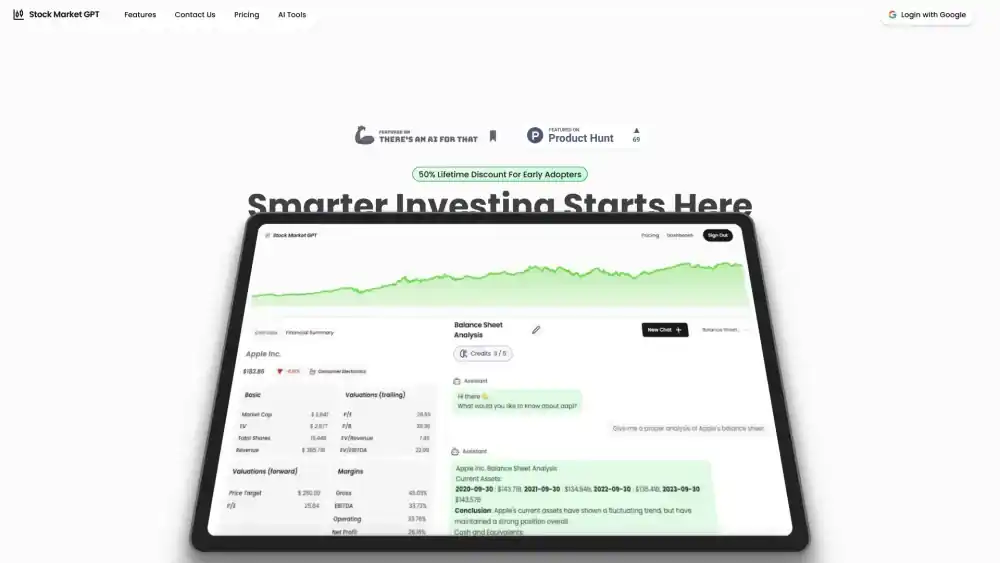Stock Market GPT: Your AI-Powered Investment Analyst
Discover the future of investing with Stock Market GPT. Our advanced AI analyzes vast amounts of market data to provide real-time insights, predictions, and personalized recommendations. Whether you’re a seasoned investor or just starting, our platform empowers you to make informed decisions with confidence.
Let Stock Market GPT be your intelligent guide to navigating the complex world of finance.
Sure. Here is a table summarizing the pros and cons of Stock Market GPT:
| Pros | Cons |
|---|---|
| Provides real-time insights and predictions based on AI analysis | Reliance on AI algorithms, which can be fallible |
| Offers personalized recommendations for informed investment decisions | Limited ability to account for unforeseen market events |
| Empowers users of all experience levels to navigate the stock market | Potential for biased recommendations based on training data |
| May help identify investment opportunities not readily apparent | Lack of human expertise and intuition in decision-making |
| Potential to streamline the investment research process | Dependence on technology and internet connectivity |
Pricing for Stock Market GPT
Stock Market GPT could offer several pricing models to cater to different user segments:
Potential Pricing Models:
- Subscription-based:
- Monthly or annual plans: Offering tiered features based on subscription level (basic, premium, pro).
- Freemium model: Providing a basic version for free with limited features, and charging for premium access.
- Usage-based:
- Pay-per-query: Charging users based on the number of queries or API calls.
- Data volume-based: Charging based on the amount of data processed.
- Hybrid model:
- Combining subscription and usage-based pricing for flexibility.
Key Considerations:
- Value proposition: Clearly communicate the value provided by different pricing tiers.
- Competitive analysis: Research pricing models of similar platforms.
- Target audience: Consider the pricing preferences of different user segments.
- Revenue goals: Determine the desired revenue generation from the platform.
- Cost structure: Account for development, maintenance, and data acquisition costs.
Would you like to explore a specific pricing model in more detail?
I can help you analyze the pros and cons of each option and provide recommendations based on your target market and business goals.
Alternatives to Stock Market GPT
While Stock Market GPT offers a unique approach to investment analysis, there are other options available:
Traditional Investment Platforms
- Brokerages: Offer tools for research, trading, and portfolio management.
- Financial advisors: Provide personalized investment advice based on financial goals.
AI-Powered Competitors
- Other AI-driven investment platforms: Explore similar platforms with different algorithms or data focus.
- Robo-advisors: Automated investment services based on algorithms and risk tolerance.
Complementary Tools
- Data analytics platforms: Provide raw data for in-depth analysis.
- Charting software: Visualize market trends and patterns.
- News aggregators: Stay updated on market news and events.
Would you like to explore a specific alternative in more detail?
I can provide information on their features, pricing, and target audience.
FAQs: Your Go-To Information Hub
FAQs, short for Frequently Asked Questions, are a collection of questions and their answers designed to provide quick and easy information to users. They’re commonly found on websites, in help centers, and within various online platforms.
Why are FAQs important?
- Efficiency: Saves time for both users and support teams by providing immediate answers.
- Clarity: Offers clear and concise information, reducing misunderstandings.
- Customer Satisfaction: Empowers users to find solutions independently, improving overall satisfaction.
- SEO Benefits: Well-structured FAQs can improve search engine rankings.
Common Topics for FAQs
The specific content of an FAQ depends on the context, but here are some general topics:
- Product or service information: Features, benefits, pricing, usage instructions.
- Customer support: Troubleshooting, returns, refunds, shipping, billing.
- Technical questions: Compatibility, installation, updates, troubleshooting.
- Account management: Login, password recovery, security, privacy.
- General inquiries: Contact information, business hours, location.
Creating Effective FAQs
To create a helpful FAQ section:
- Identify common questions: Analyze customer inquiries, support tickets, and social media to determine frequently asked questions.
- Write clear and concise answers: Use simple language and avoid technical jargon.
- Organize logically: Categorize questions and answers for easy navigation.
- Regularly update: Add new questions and answers as needed.
- Consider visual aids: Use images, diagrams, or videos to enhance understanding.
Would you like to create an FAQ for a specific product, service, or topic? I can help you brainstorm questions and write informative answers.
Do you have any specific questions about FAQs? I can provide more details or examples.
Let me know how I can assist you further!
Conclusion: The Final Act
A conclusion is the final part of something, where you sum up your main points and offer a final perspective.
Purpose of a Conclusion:
- Summarizes key points: Reinforces the main arguments or ideas presented.
- Offers final thoughts: Provides a concluding statement or opinion.
- Leaves a lasting impression: Creates a memorable ending.
- Suggests future directions: Points to potential areas for further exploration.
Common Structures for Conclusions:
- Restate the thesis: Briefly reiterate the main argument or purpose.
- Summarize key points: Condense the main supporting ideas.
- Offer final thoughts: Provide a concluding statement or reflection.
- Call to action: Encourage the reader to take specific action.
Example:Thesis: Climate change is a pressing global issue.
Conclusion: In conclusion, the evidence overwhelmingly supports the reality of climate change as a significant threat to our planet. Rising global temperatures, melting glaciers, and extreme weather events are undeniable manifestations of this crisis. To mitigate its impacts, we must urgently transition to renewable energy sources, adopt sustainable practices, and invest in climate adaptation strategies. The future of our planet depends on our collective actions.
Would you like to write a conclusion for something specific? I can help you craft a strong and effective ending.
Do you have any questions about writing conclusions? I’m happy to provide more guidance.
![]()






